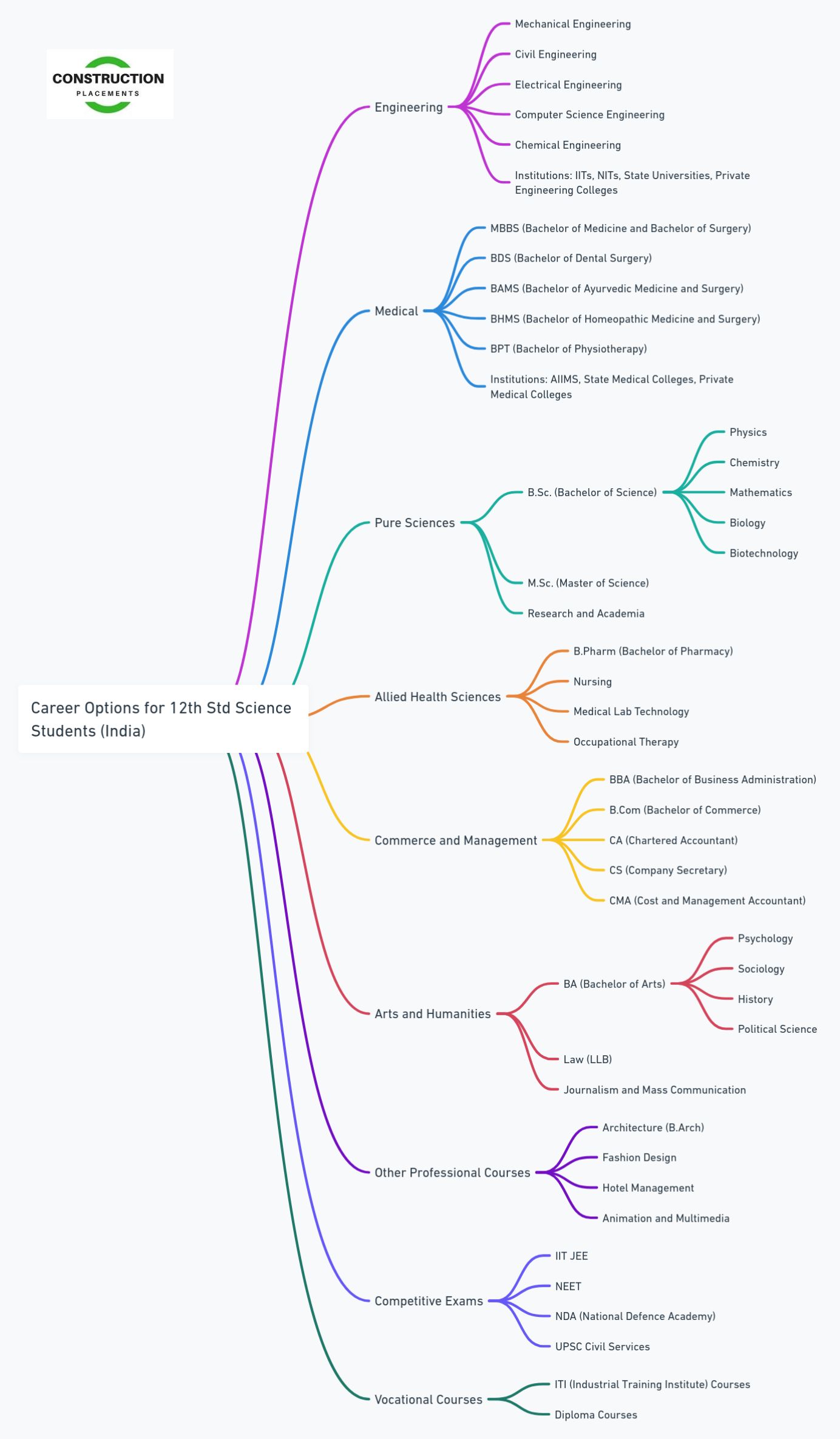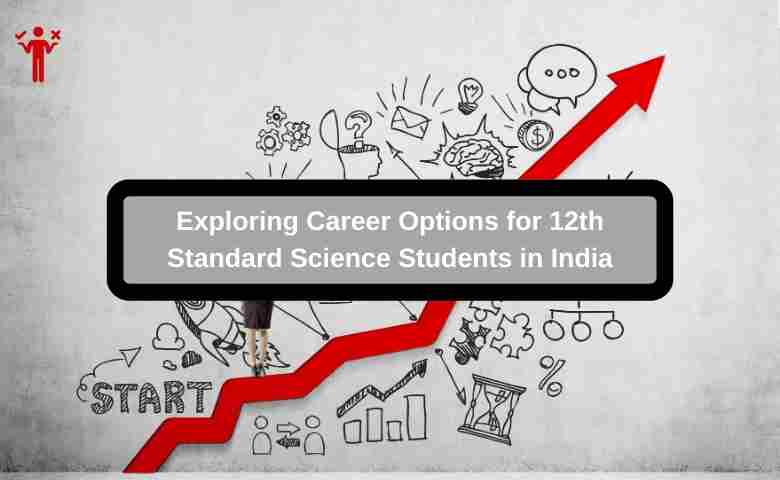Last Updated on June 14, 2024 by Admin
The results for the 12th Standard across all boards in India have been announced, and we extend our heartfelt congratulations to all the students who have passed. If you’re wondering about your next steps after completing 12th grade in the science stream, we’re here to help. We’ve compiled a comprehensive overview of the best career options available. Read on to make an informed decision about your future.
ConstructionCareerHub App is LIVE — built ONLY for construction careers. Don’t apply with a weak resume.
Get ATS-ready Resume Lab + Interview Copilot + Campus Placement Prep (resume screening, skill gaps, interview readiness) — in minutes & Other advanced features.
Explore Smarter Construction Career Tools →Quick check. Big impact. Start now.
Table of Contents
Career Options for 12th Standard Science Students in India

Engineering
Engineering remains one of the most popular career choices for science students. It offers a broad spectrum of specializations and numerous opportunities in various industries.
Mechanical Engineering
Mechanical engineering involves designing, analyzing, manufacturing, and maintaining mechanical systems. It is a versatile field with applications in the automotive, aerospace, manufacturing, and energy industries.
Civil Engineering
Civil engineering focuses on designing, constructing, and maintaining infrastructure projects like roads, bridges, buildings, and dams. It plays a crucial role in urban development and public works.
Electrical Engineering
Electrical engineering deals with studying and applying electricity, electronics, and electromagnetism. It encompasses various subfields, such as power engineering, control systems, telecommunications, and signal processing. Explore these Free Electrical Engineering online courses.
Computer Science Engineering
Computer science engineering (CSE) involves the study of computer systems, software, and applications. It covers programming, algorithms, data structures, artificial intelligence, and cybersecurity. CSE graduates are in high demand in the tech industry.
Chemical Engineering
Chemical engineering combines chemistry, physics, mathematics, and biology principles to design processes for manufacturing chemicals, pharmaceuticals, and other products. It is integral to petrochemicals, food processing, and environmental management.
Institutions:
- Indian Institutes of Technology (IITs)
- National Institutes of Technology (NITs)
- State Universities
- Private Engineering Colleges
Medical
The medical field offers various career options for healthcare and medical sciences students. It requires rigorous education and training but provides rewarding career opportunities.
MBBS (Bachelor of Medicine and Bachelor of Surgery)
MBBS is the most sought-after medical course in India. It involves studying human anatomy, physiology, biochemistry, pathology, pharmacology, and other medical subjects. After completing MBBS, graduates can specialize in surgery, pediatrics, or cardiology.
BDS (Bachelor of Dental Surgery)
BDS focuses on dental sciences and prepares students for a career in dentistry. It includes the study of oral anatomy, dental materials, orthodontics, and oral surgery. Dentists can work in private practices, hospitals, or academic institutions.
BAMS (Bachelor of Ayurvedic Medicine and Surgery)
BAMS is a degree in Ayurveda, an ancient system of medicine in India. It covers anatomy, physiology, pathology, pharmacology, and Ayurvedic principles. BAMS graduates can practice as Ayurvedic doctors or pursue research in traditional medicine.
BHMS (Bachelor of Homeopathic Medicine and Surgery)
BHMS is a course in homeopathy, a system of alternative medicine. It includes the study of homeopathic materia medica, organon of medicine, repertory, and clinical training. BHMS graduates can practice as homeopathic doctors.
BPT (Bachelor of Physiotherapy)
BPT focuses on physical therapy and rehabilitation. It involves studying anatomy, physiology, biomechanics, exercise therapy, and electrotherapy. Physiotherapists work in hospitals, clinics, sports organizations, and rehabilitation centers.
Institutions:
- All India Institute of Medical Sciences (AIIMS)
- State Medical Colleges
- Private Medical Colleges
Pure Sciences
Pure sciences offer opportunities for students interested in research and academia. It involves the study of fundamental scientific principles and conducting experiments to understand the natural world.
B.Sc. (Bachelor of Science)
A B.Sc. degree provides a solid foundation in various scientific disciplines. Students can specialize in physics, chemistry, mathematics, biology, or biotechnology.
Physics
Study of matter, energy, and their interactions. Careers include research scientist, physicist, and academic roles.
Chemistry
Study of substances, their properties, and reactions. Careers include chemist, chemical analyst, and research scientist.
Mathematics
Study of numbers, quantities, and shapes. Careers include mathematicians, statisticians, and data analysts.
Biology
Study of living organisms. Careers include biologist, ecologist, and microbiologist.
Biotechnology
Study of biological processes for industrial and other purposes. Careers include biotechnologists, research scientists, and bioinformatics specialists.
M.Sc. (Master of Science)
An M.Sc. degree allows for further specialization in a chosen scientific discipline. It is essential for advanced research positions and academic careers.
Research and Academia
Students interested in research can pursue a Ph.D. and contribute to scientific advancements. Academic careers involve teaching and mentoring students in universities and research institutions.
Allied Health Sciences
Allied health sciences include various healthcare professions that support and enhance the work of doctors and nurses.
B.Pharm (Bachelor of Pharmacy)
B.Pharm studies pharmaceutical sciences, including pharmacology, medicinal chemistry, and pharmaceutics. Pharmacists can work in hospitals, community pharmacies, pharmaceutical industries, and research organizations.
Nursing
Nursing involves providing care to patients and assisting doctors. It includes studying anatomy, physiology, pharmacology, and nursing practices. Nurses can work in hospitals, clinics, community health centers, and educational institutions.
Medical Lab Technology
Medical lab technologists perform diagnostic tests and analyze medical samples. It includes studying microbiology, biochemistry, hematology, and pathology. They work in hospitals, diagnostic labs, and research institutions.
Occupational Therapy
Occupational therapists help patients recover and improve their ability to perform daily activities. It involves studying human anatomy, physiology, psychology, and therapeutic techniques. They work in hospitals, rehabilitation centers, and community health organizations.
Commerce and Management
There are several options for science students interested in business and management.
BBA (Bachelor of Business Administration)
BBA provides foundational knowledge in business and management. It covers subjects like marketing, finance, human resources, and operations management. BBA graduates can pursue careers in business administration, management, and entrepreneurship.
B.Com (Bachelor of Commerce)
B.Com focuses on commerce, finance, and accounting. It includes studying economics, business law, taxation, and financial management. B.Com graduates can work in the accounting, finance, banking, and corporate sectors.
CA (Chartered Accountant)
CA is a professional certification in accounting. It involves rigorous accounting, auditing, taxation, and financial management training and examinations. Chartered accountants can work in public practice, corporate sectors, and government organizations.
CS (Company Secretary)
CS is a professional certification in corporate governance and company law. It involves studying corporate law, company secretarial practices, and business ethics. Company secretaries can work in corporate sectors, consulting firms, and regulatory bodies.
CMA (Cost and Management Accountant)
CMA is a professional certification in cost accounting and financial management. It involves studying cost accounting, management accounting, and strategic management. CMAs can work in manufacturing industries, corporate sectors, and consulting firms.
Arts and Humanities
Arts and humanities offer diverse career options for students interested in social sciences, humanities, and creative fields.
BA (Bachelor of Arts)
A BA degree provides a broad education in various disciplines. Students can specialize in subjects like psychology, sociology, history, or political science.
Psychology
Study of human behavior and mental processes. Careers include psychologist, counselor, and researcher.
Sociology
Study of society, social institutions, and social relationships. Careers include sociologist, social worker, and researcher.
History
Study of past events and historical processes. Careers include historian, archivist, and academic roles.
Political Science
Study of political systems, government, and political behavior. Careers include political analyst, public administrator, and academic roles.
Law (LLB)
LLB is a professional law degree. It involves studying constitutional, criminal, civil, and legal practices. Lawyers can work in legal practice, corporate sectors, judiciary, and regulatory bodies.
Journalism and Mass Communication
Journalism and mass communication involve studying media, communication theories, and journalistic practices. Careers include journalists, media analysts, public relations specialists, and content creators.
Other Professional Courses
Several professional courses offer specialized training and career opportunities in various fields.
Architecture (B.Arch)
B.Arch focuses on the study of architecture and design. It involves studying architectural principles, building materials, construction techniques, and design aesthetics. Architects can work in architectural firms, construction companies, and urban planning organizations.
Fashion Design
Fashion design involves creating clothing and accessories. It includes studying fashion trends, design techniques, textiles, and garment construction. Fashion designers can work in fashion houses, apparel companies, and as independent designers.
Hotel Management
Hotel management involves studying hospitality, tourism, and hotel operations. It includes studying food and beverage management, housekeeping, front office operations, and event management. Careers include hotel managers, event planners, and hospitality consultants.
Animation and Multimedia
Animation and multimedia involve creating visual content using animation and graphic design techniques. They also include studying 2D and 3D animation, graphic design, and multimedia production. Careers include animators, graphic designers, and multimedia specialists.
Competitive Exams
Several competitive exams offer entry into prestigious institutions and government services.
IIT JEE
The Joint Entrance Examination (JEE) is an entrance exam for admission to engineering programs in IITs, NITs, and other prestigious institutions. It tests students’ knowledge in physics, chemistry, and mathematics.
NEET
The National Eligibility cum Entrance Test (NEET) is an entrance exam for admission to medical programs (MBBS, BDS, etc.) in India. It tests students’ knowledge in physics, chemistry, and biology.
NDA (National Defence Academy)
The Union Public Service Commission (UPSC) conducts the NDA exam for admission to the National Defence Academy. It provides entry into the Indian Army, Navy, and Air Force.
UPSC Civil Services
The UPSC Civil Services exam is a competitive exam for recruitment to various civil services in India, including the Indian Administrative Service (IAS), Indian Police Service (IPS), and Indian Foreign Service (IFS). It tests candidates’ knowledge in general studies, aptitude, and specific subjects.
Vocational Courses
Vocational courses offer practical training and skills development in various trades and professions.
ITI (Industrial Training Institute) Courses
ITI courses provide technical education and vocational training in trades like electrician, mechanic, welder, and fitter. ITI graduates can work in industries, workshops, and technical services.
Diploma Courses
Diploma courses offer specialized engineering, healthcare, hospitality, and design training. They provide practical skills and knowledge for specific professions. Careers include technical roles, healthcare assistants, hospitality staff, and design technicians.
The Takeaway
Choosing a career path after the 12th standard is a significant decision that requires careful consideration of one’s interests, strengths, and career goals. The science stream offers many options, from traditional fields like engineering and medicine to emerging areas in pure sciences, commerce, management, arts, and vocational training. Exploring these options and understanding the career prospects can help students make informed decisions and embark on a successful career journey.
Related Posts:
- Introduction to Construction Careers
- Steps to Take After a Construction Site Injury
- Data Science Career and Jobs: A Complete Guide
- Is Civil Engineering Hard to Study?


